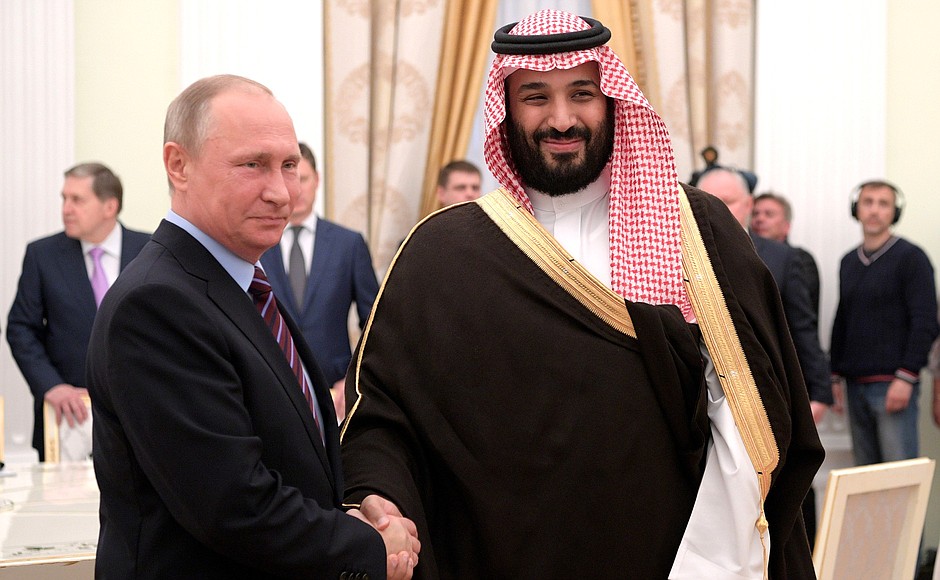
Russian President Vladimir Putin and Saudi Crown Prince Mohammad bin Salman (Wikimedia Commons)
by James M. Dorsey 14 August 2019
Russia, backed by China, hoping to exploit mounting doubts in the Gulf about the reliability of the United States as the region’s sole security guarantor, is proposing a radical overhaul of the security architecture in an area that is home to massive oil and gas reserves and some of the world’s most strategic waterways.
Chinese backing for Russia’s proposed collective security concept that would replace the Gulf’s US defense umbrella and position Russia as a power broker alongside the United States comes amid heightened tension as a result of-tit for-tat tanker seizures and a beefed up US and British military presence in Gulf waters.
Iranian revolutionary guards last weekend seized an alleged Iraqi tanker in the Gulf of Hormuz.
Iran said the vessel was smuggling oil to an unidentified Arab country. The taking of the Iraqi ship followed last month’s Iranian seizure of the British-flagged tanker Stena Impero.
The seizure was in response to the impounding off Gibraltar of an Iranian tanker suspected of breaching EU sanctions against Syria.
The Russian proposal entails creation of a “counter-terrorism coalition (of) all stakeholders” that would be the motor for resolution of conflicts across the region and promote mutual security guarantees. It would involve the removal of the “permanent deployment of troops of extra-regional states in the territories of states of the Gulf,” a reference to US, British and French forces and bases.
The proposal called for a “universal and comprehensive” security system that would take into account “the interests of all regional and other parties involved, in all spheres of security, including its military, economic and energy dimensions.”
The coalition, to include the Gulf states, Russia, China, the US, the European Union and India as well as other stakeholders, a likely reference to Iran, would be launched at an international conference on security and cooperation in the Gulf.
It was not clear how feuding Gulf states like Qatar, Saudi Arabia, the United Arab Emirates and Iran would be persuaded to sit at one table. The proposal suggested that Russia’s advantage was that it maintained good relations with all parties.
Chinese backing of the Russian proposal takes on added significance with some analysts suggesting that the United States, no longer dependent on Gulf oil imports, is gradually reducing its commitment despite a temporary spike in the number of US troops dispatched to the region as a result of the tension with Iran.
They suggest that the US response to Iranian racking up of tension has been primarily theatrics and hand wringing despite the Trump administration’s bellicose rhetoric. Warnings of “severe consequences”have proven to be little more than verbal threats.
“The United States is leaving the Persian Gulf. Not this year or next, but there is no doubt that the United States is on its way out… Leaders in Riyadh, Abu Dhabi, Doha, Manama, and Muscat understand what is happening…and have been hedging against an American departure in a variety of ways, including by making overtures to China, Russia, Iran, and Turkey,” said Steven A. Cooke, a scholar at the New York-based Council on Foreign Relations.
Recent tanker statistics suggest that Saudi Arabia is sending an ever-larger portion of its crude to China. On a visit to Beijing last month, UAE crown prince Mohammed bin Zayed and Chinese president Xi Jinping elevated their two countries’ relationship to that of a strategic partnership.
Perceptions of a reduced US commitment may make the Russian proposal of a multilateral approach more attractive in the short term. However, longer term banking on a continued Russian Chinese alliance could be tricky. The alliance could prove to be opportunistic rather than strategic.
That could force Gulf states to accelerate taking charge of their own security. So far, greater Gulf assertiveness has proven to be a mixed bag.
Fuelled by uncertainty about US reliability, perceived regional Iranian expansionism, and persistent popular discontent across the Middle East and North Africa, produced the debilitating Saudi-UAE intervention in Yemen, a failed Saudi effort to force Lebanon’s prime minister to accept the kingdom’s dictate, and Saudi and UAE projection of military force and commercial clout in the Horn of Africa.
A recent meeting between UAE and Emirati maritime security officials, the first in six years, as well as a partial UAE withdrawal from Yemen could, however, signal an emerging, more constructive approach.
If adopted, the Russian proposal could, however, suck China and Russia, despite having been able so far to maintain close ties to all sides of regional divides, into the Middle East’s multiple conflicts, particularly the Saudi Iranian rivalry. A multilateral approach could also bring latent Chinese Russian differences to the fore.
Dubbing the Russian Chinese alliance ‘Dragonbear,’ geo-strategist Velina Tchakarova cautions that it is s “neither an alliance nor a marriage of convenience, but rather a temporary asymmetric relationship, in which China is predominantly the agenda-maker, while Russia is mostly the agenda-taker.”
The Russian Chinese rapprochement operates in Ms. Tchakarova’s words on “the maxim ‘Keep your friends close and your enemies closer.’ A status quo relationship would remain acceptable and be further developed so long as China’s rise is not a direct threat to Russia’s strategic interests of self-determination and security along its peripheries,” including the Middle East.
The question is less whether and more when Russia starts perceiving Chinese interests as a threat to its own. One divergence could be energy given that Russia is one of the world’s major oil suppliers while China is its top importer.
By the same token, China may longer term not want to be dependent on Russia for both its imports and the arrangements that would secure them.
Said Russia and Eurasia scholar Paul Stronski referring to the sustainability of the Russian Chinese alliance: “With China now recognising it may need to strengthen its security posture…, it is unclear how long that stability will last.”
